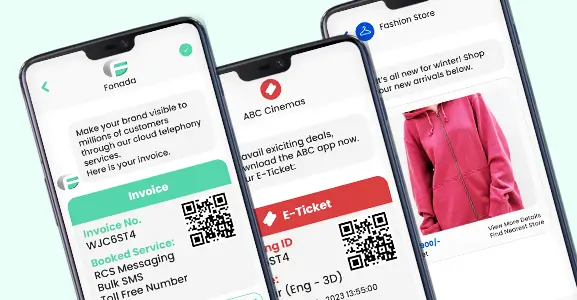The cloud is changing how people collaborate, communicate, and do business in today’s digital world. The cloud has driven innovations in machine learning, the Internet of Things (IoT), artificial intelligence, autonomous vehicles, and mobile apps. Furthermore, it has brought a significant change in the business of telecommunications forever.
All business types and sizes prefer implementing and embracing cloud strategies to boost revenue and drive growth. Now, 85% of modern companies use cloud technology to gather information. According to Cisco, 94% of the global workload might be administered in the cloud by 2021. Cloud communications are data communications and internet-based voice tools for business enterprises to manage apps, storage, and switching, hosted by 3rd parties on the cloud.
=======================================================================
Read More: Top 10 Most Popular Bulk SMS Service Providers In India
=======================================================================
The prime question is how to make your calling business future-ready with cloud communication solutions. The article answers the same question and other aspects of cloud communications, such as their types and future characteristics.
Introduction
Cloud communication embraces the key to the business communication future. So, what is cloud communication? Cloud communications are internet-based voice tools and data communications systems for business enterprises to manage switching, apps, and storage. They let companies have many communication channels for the team and customer connection via email, chat, video, or voice calls, using internet-based connectivity to eliminate lag and bad communication connections.
The business can subcontract systems management responsibilities (switching, provisioning, security, and data storage) to cloud communications providers, which clearly simplifies and reduces costs. Moreover, advanced features and functionality of cloud technology enable employees to communicate and collaborate successfully.
What Is A Communication Platform?
A business communication platform is a system that allows business organizations to improve their workflows and distribute the correct information in real time via the cloud. These platforms let remote and co-located teams communicate and collaborate promptly via video conferencing, team messaging, or phone. Robust communications platforms facilitate communication and teamwork regardless team’s location using free HD video, voice quality, video conferencing, and screen sharing. They ensure enhanced productivity and a synchronized work environment with featured calendar integrations.
Dropbox, Google Drive, Microsoft Office, Skype, Slack, and Salesforce are excellent communication and collaboration solutions available on the market. Cloud computing plays a vital role in
- Improving workplace productivity
- Reducing the total cost of ownership
- Adding value strategically with updated technology
- Focusing on business rather than infrastructure
- Covering security, backups, and disaster recovery
- Achieving scalability and flexibility
- Deploying mission-critical technology to deliver substantial benefits
- Allowing more efficient use of resources
- Reducing carbon footprint
- Providing a positive impact on the world around
It is clear what cloud communications are. So, move ahead to know more about making your calling business future-ready by banking on cloud communication solutions.
Typical Communications Used In Cloud Computing
Voice over internet protocol (VoIP) hosted private branch exchange (PBX), video conferencing, file sharing, messaging, and business SMSs are some of the distinctive enterprise communication solutions offered under cloud computing.
VOIP-Hosted Private Branch Exchange (PBX)
Gone are the days when cloud services were data-centric. The evolution of VOIP has made cloud phone systems highly valuable. VoIP phone systems offer a flexible and robust solution in a business world that adopts new technology trends to deliver integrated customer experiences and stay connected across geographical borders.
The functionality of cloud telephony shows how VoIP service providers direct business phone calls by altering analog voice signals into data packets. The business install SIP trunking to send and receive calls via IP networks using a cloud PBX. Now, users can communicate with customers using any internet-connected device with a single click. Business owners can manage a cloud contact center with a dashboard that offers better control over phone numbers, call monitoring, and user management. Some of the numerous benefits of cloud telephony for businesses include cost-efficient, mobility, flexibility, scalability, and productivity.
Messaging And Business SMS
Businesses use text chat and business SMS to send and receive text messages between departments, teams, and customers. These communication methods help share information quickly with no phone/video chat. Business communications solutions come from chatting, enabling employees to discuss projects and tasks, and switching between a phone/video meeting and text chat. Messaging and business SMS meet all your communications needs in one place.
File Sharing
When you have data storage, backup, and sharing on the cloud, you get collaboration capabilities and increased security for both co-located and dispersed teams. Your teams can instantly access data and project resources using cloud-based file sharing and storage through a continuously updated database. It is highly beneficial for team collaboration in different time zones, and it also means freedom from sticking to inefficient email chains used to have right information. So, cloud storage smartly improves business continuity with data backup and cloud security.
Video Conferencing
Internet telephony makes video conferencing easy when it comes to communicating through invaluable face-to-face video calls. Real-time videos let participants express themselves with emotions, expressions, and tonality with conferencing features such as screen recording and sharing. VoIP solutions on mobile devices enable your teams to collaborate and communicate by joining video meetings on the go from different locations anywhere in the world. Video meetings fuel expressive interactions and boost employee engagement.
Future Of Cloud Communications
This section will inform you how you can make a calling business ready for future challenges with cloud communication solutions. Nowadays, business enterprises are transferring their data and apps to the cloud for higher scalability, security, and simplicity. Cloud communication is a collection of products providing benefits to consumers. The pandemic and the need for remote access were responsible for the fast acceleration of cloud adoption. Cloud communications offer considerable cost savings to enterprises. According to IDC, computer and storage goods spending for cloud infrastructure increased by 12.5% in the last year.
Organizations that adopt cloud-based communication channels will likely be equipped for the future of work with a richer customer experience. Cloud communications ensure more flexible working environments for better video meetings, call monitoring, team collaboration, call recording, call forwarding, and admin management. Examine how cloud-based communication enables businesses to expand further in the future.
Telecom Services And Video-Calling
Adopting telecom services through the cloud is vital for the growth of organizations directing to expand globally. A cloud-oriented virtual telecommunications service removes the need for expensive on-premise equipment and other upgrading and maintenance expenditures. WebRTC video calling and conferencing is ideal for general communications with standard formats and codecs and widespread broadband access. If you don’t use WebRTC, the user must first upload the file to a server, and then the receiver will download it.
Technical Challenges
Companies in remote work locations face many technical issues as they have to deal with concurrent video conferencing sessions. Here, the networking issue emerges as a big challenge. So, business enterprises can use different network traffic management tools concerning existing Cloud apps.
5G, the next global mobile wireless standard, will enable flexible and remote and flexible working but at a cost. So, businesses need to understand the support they offer their staff with more affordable connections, which should be the top concern for IT executives in the future.
Rethinking Communication
Flexible cloud-based services are increasing across businesses with the dynamic shift to hybrid work models. It is high time for business executives, decision-makers, and technology investors to re-assess future roadmaps and technological capabilities. Outdated, siloed, and non-integrated communication technologies need a big update and better alignment with future business goals.
Contact Center As A Service (CCaaS) Platforms
According to a study from GM Insights, the VoIP industry’s net worth touched $30 billion in 2020, with a CAGR (compound annual growth rate) of 15% in 2021. This net worth is projected to reach $95 billion in 2027 due to cost-benefits over traditional landlines, rising demand for mobility, and upcoming 5G technology. VoIP is the prime technology for cloud communications that led to the development of Unified Communications as a Service (UCaaS) with streamlined business processes and centralized business communications channels. CCaaS platforms deliver UCaaS solutions for customer service or sales teams that frequently deal with high quantities of client conversations. UCaaS solutions include artificial intelligence (AI) tools to assist client satisfaction and interaction efficiency.
Increased Customization
Cloud communications services significantly improve usability and customize the user experience with many configurable features. Customization will include user type, use case, and business necessity. Legal, compliance, accountants, payroll, IT, and customer service people need a communications system in a shared center setting for better performance. So, cloud communication solutions will be available through various plans, pricing, and features for each use case in the future.
=======================================================================
Read More: What Is Missed Call Marketing And How Does Missed Call Marketing Work?
=======================================================================
Switch To Unified Communications Platforms
It is clear that all business enterprises must make their calling business future ready to stay ahead in the competition and serve their customers well. Cloud communication solutions can do wonders here, and it is time to update and implement a futuristic strategy to utilize cloud communication solutions better. All enterprise communications platforms are different, and some of them deliver greater functionality, whereas some of them may target call centers.
On the other hand, some may target enterprises. Switching to a unified communications platform is the need of the hour. Before moving, it is vital to go through several benefits of switching to any platform.
- Improved flexibility and productivity
- Tapping into a remote workforce
- Cost-effective solutions for businesses
- Grow as your business grow with scalability
- Enhanced data security and regulatory compliance
- Complete transparency and extensive measures at each system architecture level
The modern era is a digital transformation era. So, a cloud-based business model makes sense. Cloud communications are not restricted to cloud telephony, hosted PBX, or Unified communications, and Digital transformation is a better way of building, scaling, and deploying business communication systems.
With fast-changing technological trends and the global workforce becoming remote, there is a need to improve communications services. Moreover, these services should transcend the outdated limitations of legacy systems significantly.
When evaluating the future of cloud-based communications, you need to align developments in business needs with higher mobilization, increased functionality, and enhanced customization opportunities. Remember that the cloud is not exhibiting any signs of slowing down; it is here to stay and dominate.
Conclusion
The above discussion on cloud communication lets you better understand the process of making calling businesses ready for the future with unique cloud communication solutions. It indicates that cloud-based communication is a great business strategy to expand your business further in the coming years. Cloud communications are not just cloud telephony; it is a unique way to build, deploy, and scale business communication systems. The need for communication services has become significant in a world where technology trends shift fast.
If you need cloud-based communication solutions, you must take advice and help from a leading cloud communication services provider in India. For more information on B2B cloud-based communication solutions for your unique business, call 1800 137 3839 or email info@fonada.com.
FAQs
Cloud communications delivered via cloud communication platforms give the business many communication channels for accessing team and customer connections. Cloud-based communication methods include chat, video, email, and voice calls with the help of internet-based connectivity that smartly eliminates bad connection and communication glitches. You can easily communicate through data and telephony with cloud communication solutions. Nowadays, data-based communication is becoming popular through the intelligent use of emails, direct messaging services, and apps.
The three primary cloud communication services are ideal for all businesses, and they include public cloud, hybrid cloud, and private cloud.
- Public Cloud Communications – Most common communications deployment model for small to mid-sized businesses
- Private Cloud Communications – Most popular with larger companies looking for cloud benefits with a higher degree of security
- Hybrid Cloud Communications – Most popular cloud communications deployment model that allows businesses to get proper access to the communications stack
MQTT and HTTP protocols are the best used for cloud application communication. MQTT is a standard publish/subscribe protocol in machine-to-machine interactions, and embedded devices support it. On the other hand, HTTP is a “connectionless” protocol.
Cloud-based communication relates to internet tools that enable efficient voice and data communication through the cloud.
Cloud system communication helps businesses when they can’t communicate well. Without cloud communication, businesses can’t land new clients, collaborate effectively, or improve marketing tactics. Adopting the cloud can help you improve your company’s business communications by
- Mastering remote working
- Allowing employees to work from any device
- Creating less outsourcing and more decentralizing
- Making collaboration more effective
- By going regional, national, and global
Cloud communication technique lets companies establish a point of customer contact successfully over the internet. It leverages cloud-hosted platforms, technologies, tools, and platforms to maneuver customer contact by sending messages, hosting conversations, and arranging video conferences.

Dec 11, 2024
Top Contact Center Optimization Tools For 2024
“A thriving business knows how to fetch maximum output from limited resources by optimizing ca... Read More
Nov 13, 2024
What Is Brand Communication? CPaaS Role Explained
Did you ever wonder why some advertisements grab your attention instantly, while others do not? The... Read More
Nov 01, 2024
What Is Automated Messaging And How Does It Work?
Automated messaging or text automation empowers businesses and marketing professionals to connect wi... Read MoreLatest Updates
From Fonada
Industry Insights, Trends, Innovations, Updates, and Case Studies from Industry Experts
View
Customer
Reviews
Discover why our customers love us - read their authentic and heartfelt reviews!
View
Case
Studies
Explore real-life scenarios, offering analysis, and solutions to practical challenges
View
Convert Leads Into Sales With Fonada
Trusted CPaaS Solution Provider







